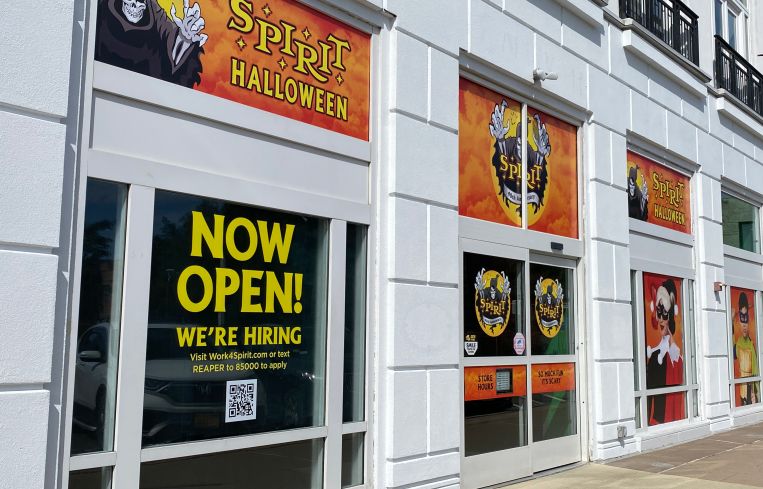Why Retailers Should Watch Spirit Halloween’s Foray Into the Jolliest Time of Year
Spirit Halloween will convert 10 stores into Christmas shops as the pop-up tests its luck in a new holiday
By Amanda Schiavo October 18, 2024 9:00 am
reprints
Each year, pop-up retailer Spirit Halloween temporarily moves into thousands of vacant storefronts around the U.S. to help fans of the spooky season shop for decor, costumes and more, typically exiting when the calendar flips to November. But the Spencer’s-owned retailer now plans to stay in some of those locations a little longer, tossing its pointy hat in the Christmas shopping ring.
Spirit Christmas, as the stores will be known, will set up shop at just 10 locations in the Northeast — including in New Jersey, Connecticut, Massachusetts, Pennsylvania and upstate New York — as it tests out a new Christmas business model, something experts in the real estate space agree other retailers will want to keep an eye on.
And it makes sense for ghoulish Spirit to turn into the ghost of Christmas present this year. Total consumer spending for Halloween in 2024 is expected to drop from a record $12.1 billion in 2023 to $11.6 billion, according to the National Retail Federation. However, total Christmas spending is expected to rise this year, and retailers are gearing up for a holly jolly holiday season.
“Spirit is taking advantage of the holiday retail boom, by using their existing locations and infrastructure for more than just Halloween, while providing in-store experiences that attract shoppers in a time when online retail dominates,” Adelaide Polsinelli, vice chairman at Compass, said in an email to Commercial Observer. “If successful, this could be a signal for them to move into other seasonal markets, shifting how they operate moving forward and even extending leases beyond pop-ups.”
When Spirit — who did ghost us when we asked for comment — brings one of its stores into a building it’s a “win-win” for the landlord and the tenants, said Michael Burden, co-head of North America real estate services at investment firm Gordon Brothers.
“Spirit’s model is especially attractive because the short-term leases they offer often include flexible terms, allowing landlords or sublandlords the ability to terminate the agreement on short notice if a long-term tenant is secured during the pop-up’s operation,” Burden said via email. “This smart, flexible strategy creates a win-win scenario, allowing all parties to benefit from the arrangement.”
Spirit also has a great reputation among landlords, Burden said. Considering that and those flexible terms, it makes sense owners would want to keep Spirit in its spaces a little longer, even on a temporary basis, he said.
“They have been very successful for a very long time with their Halloween concepts,” he said. “And quite frankly, it seems like a natural progression. They can operate pop-up stores better than anybody.”
Spirit Halloween was founded in 1983 and opens over 1,500 seasonal stores each year, according to its website. Its ubiquity in the vacant storefronts of malls, shopping centers and other shuttered retailers has resulted in the brand becoming a social media darling in the form of memes relating to its fame for taking over dead spaces (including the original Barneys store in 2021).
From a broader retail perspective Spirit’s experiment — if successful — has the potential to generate more ideas and competition that could be another shot in the arm to brick-and-mortar retail, Polsinelli told CO.
There is a trend among retailers where creating more emotional connections with consumers is becoming critical, according to Polsinelli. From her own perspective as a consumer, shopping at a Spirit Halloween isn’t a typical item on her autumn to-do list, but she said she is excited to visit a Spirit Christmas.
“Here’s a tenant who is more experiential, and their business model is [built] on happy items,” she said. “I don’t necessarily like Spirit Halloween, but I want to go to the Christmas store and I want to see them do an Easter store. I want to see them do a Hanukkah store. I want to see them through all these fun stores where you walk in and you smile. That goes a long way and through the trend of innovation in retail.”
But it’s unlikely that Spirit Halloween dipping its toe into the Christmas market and extending its leases in a few locations will be enough on its own to revitalize brick–and-mortar retail, Burden said.
Indeed, demand for retail space in shopping centers, where you can often find a Spirit Halloween, is by no means “red hot” according to data from Cushman & Wakefield. Following three years of retail openings outpacing closures, the market has cooled this year. Nationwide, retail closures are expected to exceed openings by about 500 stores in 2024, according to the C&W report.
This trend of closures is “highlighting the growing financial pressures in the corporate retail world,” the report notes.
The report also noted that the number of bankruptcies by major retailers recorded by the end of the third quarter had already exceeded the bankruptcy total for all of 2023. Additionally, some big names including 7-Eleven, GameStop, Stop and Shop, Walgreens and Big Lots have all recently announced plans to shutter stores as inflation and declining sales continue to take their toll.
“By nature [Spirit] is temporary, it’s not a permanent solution,” Burden said. “Other than making an entire center more marketable and perhaps bringing in [other] interested parties, I don’t see it [creating] a major shift.”
Amanda Schiavo can be reached at aschiavo@commercialobserver.com.



